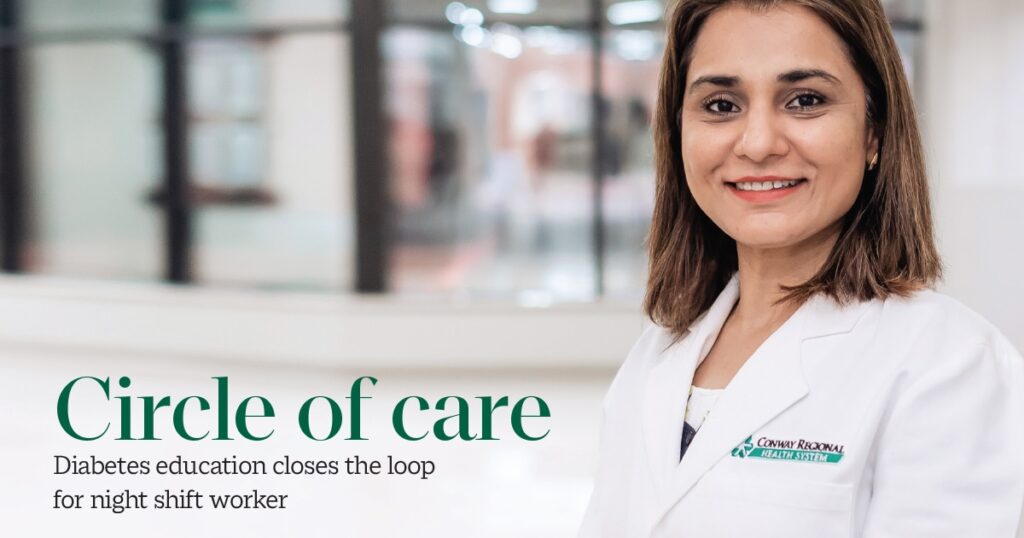03 Dec 2023 Diabetes education closes the loop for night shift worker
Picture this: It’s the dead of night, but while everyone sleeps, you’re clocking into a night shift with eyes weighed down by fatigue. Now, layer on the silent battle of wrestling with a blood sugar level that screams danger at 14 percent, turning each task into an even more challenging effort.

Stanisha Maltbia, a night shift worker at the Conway Human Development Center, was hospitalized earlier this year due to her high blood sugar levels. Elevated blood sugar levels (diabetes) can cause tiredness, increased thirst, nausea or vomiting, blurred vision, drowsiness and other symptoms. This can lead to heart disease, stroke and other life-threatening conditions.
Stanisha, who has Type 1 diabetes, felt like her body was shutting down because her blood sugar levels were out of control, and she didn’t know what to do. That all changed for Stanisha after her primary care doctor, Thad Hardin, MD, referred her to Maria Javaid, MD, an endocrinologist at the Conway Regional Endocrinology and Diabetes Center.
While Stanisha’s health is still a work in progress, she is thankful for the physicians, diabetes educators and dietitians who have made managing a chronic illness much more manageable. She has dropped her A1C from 14 to 6.9 percent with their teamwork.
“At Conway Regional, we help patients manage diabetes beyond medication. We offer a comprehensive approach, integrating elements like diet, diabetes education, physical activity and one-on-one nutrition counseling, all located at our medical center in Conway, ” said Maria Javaid, MD.
“With our state-of-the-art endocrinology and diabetes center, we provide a unique, convenient and highly effective environment for patient care. This not only simplifies the journey for our patients but also leads to the most personalized care.”
Stanisha did not discover that she had Type 1 diabetes until she was 25 years old. The difference between Type 2 diabetes and Type 1 diabetes is that Type 1 patients do not have a functioning pancreas to make insulin.

At first, there was no avoiding frequent injections. “I was tired of injecting myself with insulin, getting sick and not knowing what was wrong,” said Stanisha. That ended when she visited Dr. Javaid.
Dr. Javaid referred her to the Conway Regional Wellness and Diabetes Education Department for diabetes self-management classes and ordered an insulin pump and a continuous glucose monitor. Now, Stanisha can keep track of her blood sugar level using a mobile phone app.
Stanisha also began diabetes education classes and one-on-one meetings with Jordan Johnson, a licensed clinical dietitian at Conway Regional. “The first thing she taught me was how to count carbs and read food labels,” said Stanisha. “Managing my diabetes forces me to eat more. Working night shift, I used to skip lunch and dinner. Nutrition for diabetes management involves eating healthier, smaller meals and snacks more often.”
“We focus on a balanced approach to eating,” said Johnson. “Stanisha was very open to trying new things to control her A1C better, especially counting carbs and using measuring cups to ensure she ate the right portions.
“You feel awful when your A1C is that high,” she said. Johnson has Type 1 diabetes herself, which helped motivate her to become a dietitian. “The continuous glucose monitor and the insulin pump helped change all of that for Stanisha.”
“We are very fortunate to have our Endocrinology Clinic here at Conway Regional,” said Ashley Cornett Robb, wellness manager, dietitian and certified diabetes educator. “Before, patients would have to go to Little Rock or Northwest Arkansas. Now, they can get all their diabetes care in one area. It is great to be able to close that loop for our patients with diabetes. Patients are so excited to have a diabetes specialist close by.”
The Conway Regional Diabetes and Endocrinology Center providers are Maria Javaid, MD, Hooman Motahari, MD, and Beth Strack, APRN.
In addition to diabetes, Conway Regional Diabetes and Endocrinology Center treats other types of hormonal disorders, including thyroid disease, low potassium, hypoglycemia, calcium disorders, hypertension, polycystic ovarian syndrome and other endocrine system conditions.









